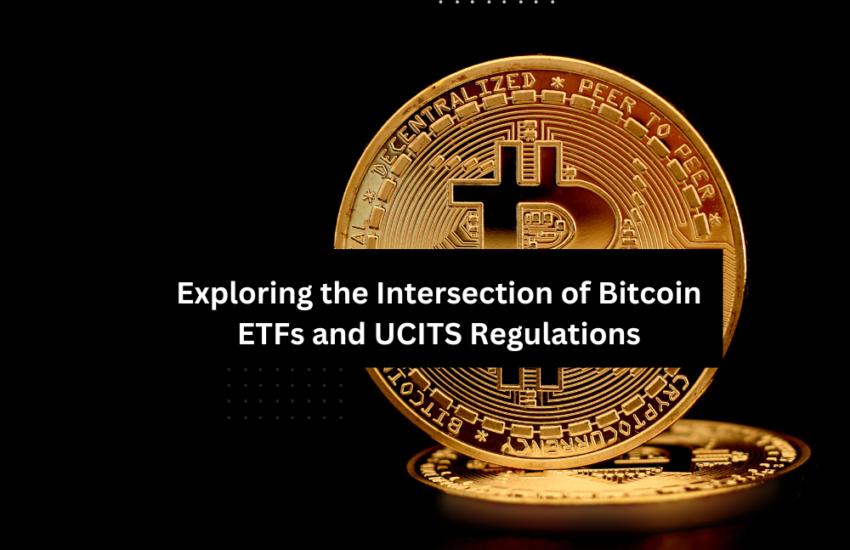Bitcoin ETFs, or Bitcoin Exchange-Traded Funds, are investment funds that allow investors to buy units representing the value of Bitcoin without having to hold the crypto-currency directly. These ETFs offer an easier, regulated alternative for investing in Bitcoin, making them attractive to investors looking to expose their portfolio to the crypto-currency.
UCITS, or Undertakings for Collective Investment in Transferable Securities, are investment vehicles that pool funds from several investors to invest them in a diversified portfolio of securities. In the European Union, UCITS are subject to strict regulations designed to protect investors and ensure the transparency of transactions.
The aim of this article is to explore how Bitcoin ETFs fit into the UCITS framework and what this means for investors. By integrating Bitcoin ETFs into a regulated environment such as UCITS, investors benefit from increased supervision, rigorous management standards and enhanced protection mechanisms. This can help increase investor confidence in these financial products and encourage wider adoption of Bitcoin as a legitimate asset class.
Understanding UCITS and their relevance to ETFs
UCITS, or Undertakings for Collective Investment in Transferable Securities, are investment vehicles that pool funds from several investors and invest them in a diversified portfolio of securities. In Europe, UCITS play a key role in the standardisation of investment funds by setting strict standards to ensure high levels of investor protection. These standards include criteria and regulatory requirements that investment funds must meet to be considered UCITS compliant.
To be UCITS compliant, investment funds must comply with strict rules on management, portfolio diversification, transparency and investor protection. These requirements are designed to ensure that funds are managed professionally, that risks are controlled and that investors are provided with transparent information on performance and associated costs.
UCITS compliance is particularly beneficial for ETFs, especially those based on digital assets such as Bitcoin. By bringing Bitcoin ETFs into the regulated UCITS framework, investors benefit from increased supervision, rigorous management standards and enhanced protection mechanisms. This will help to boost investor confidence in these financial products and encourage wider adoption of Bitcoin as a legitimate asset class.
The challenges of integrating Bitcoin ETFs into UCITS
The integration of Bitcoin ETFs into UCITS faces a number of regulatory and operational challenges due to the volatile nature of crypto-currencies and the strict requirements of UCITS. Firstly, Bitcoin’s price volatility can pose risk management challenges for investment funds seeking to include this crypto-currency in their portfolios. Fund managers need to put in place robust risk control mechanisms to mitigate Bitcoin’s price fluctuations.
In addition, Bitcoin’s liquidity can pose a challenge, as crypto-currency markets can be less liquid than traditional markets. Fund managers need to ensure that they can buy and sell Bitcoin efficiently to meet investor redemption requests. Accurately valuing Bitcoin is also a challenge, as there is no centralised market for this crypto-currency. Fund managers need to put in place reliable mechanisms to value Bitcoin transparently and accurately.
The secure storage of Bitcoins is another major challenge, as digital assets are vulnerable to piracy and theft. Fund managers need to implement robust security protocols to protect investors’ digital assets. Finally, investor protection is a major concern when integrating Bitcoin ETFs into UCITS. Fund managers must ensure that investors are fully informed of the risks associated with crypto-currencies and that they benefit from adequate protection mechanisms in the event of fund failure.
Read: Smart Choices for Systematic Investment Planning
Current situation and future prospects
Currently, Bitcoin ETFs face challenges in complying with UCITS regulations due to the regulatory and operational hurdles mentioned above. However, some attempts have been made to align Bitcoin ETFs with UCITS requirements. For example, in the US, the SEC has reviewed several applications for Bitcoin ETFs but has not yet approved such a product due to concerns about market manipulation and investor protection. In Europe, the situation is similar, with regulatory discussions underway regarding the integration of crypto-currencies into UCITS. Some European countries have expressed interest in Bitcoin ETFs, but questions remain about how these products can be effectively regulated to ensure investor protection.
For the future of Bitcoin ETFs in UCITS, it is likely that regulators will continue to scrutinise these products and put in place appropriate regulatory frameworks to ensure compliance. Potential market demand for Bitcoin ETFs remains high, particularly among institutional investors looking to diversify their portfolios with digital assets.The evolving crypto-currency regulatory landscape in Europe could also play a vital role in the viability of Bitcoin ETFs in UCITS. If regulators manage to put in place clear and robust regulatory frameworks for crypto-assets, this could pave the way for greater acceptance of Bitcoin ETFs in traditional investment funds.
Conclusion
The integration of Bitcoin ETFs into UCITS represents potential to diversify traditional investment portfolios. However, significant regulatory and operational challenges currently stand in the way of their widespread adoption. Regulators need to strike a balance between financial innovation and investor protection to enable the development of safe and sound investment products in the crypto-currency space.
Regulatory adaptability makes it possible to keep pace with the rapid evolution of technology and financial markets, while guaranteeing the transparency and security of investments. Ongoing discussions in Europe on the regulation of crypto-assets could shape the future of Bitcoin ETFs in UCITS and open up new opportunities for institutional investors.
You should keep abreast of developments in this evolving area, as the successful integration of Bitcoin ETFs with UCITS could have a significant impact on the European investment landscape. By encouraging responsible innovation and collaboration between regulators and industry, we could see the emergence of attractive and diversified new investment products, offering investors unique opportunities in the world of crypto-currencies.

